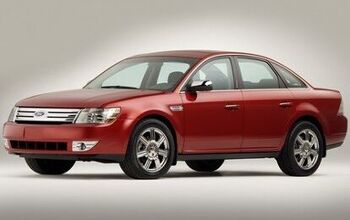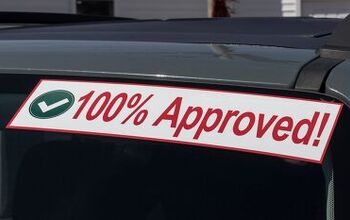Ford's Dej Vu Moment, Part 1

Oil prices have just hit record highs. Talk of recession is in the air. Ford’s line-up of bloated, heavy vehicles is piling-up like cord-wood on the dealer’s lots. The only car selling: its “Americanized” global compact. Ford stock is in the toilet and bankruptcy rumors are swirling. The top exec hired a year earlier is intelligent, unassuming and straight-talking. He commits Ford to building “higher quality products with stronger customer appeal… emphasizing smaller, more efficient cars.” Ford in 2008? No, it’s 1981.
Like current Ford CEO Allan Mulally, Donald E. Petersen was an atypical choice when he was promoted to the Presidency by the Ford family in 1980. An engineer, development executive and genuine piston-head, Petersen was also the antithesis of Lee Iacocca, whom he replaced. Never in modern history has an automotive CEO been so devoid of spin and hyperbole. No wonder Ford of the eighties looked to Japan for inspiration.
Petersen learned of Toyota’s use of quality guru Edward Deming. In the first coherent US automaker assault on “total quality,” Petersen adopted Deming’s techniques, and those of corporate guru Peter Drucker. As measured by owners, Ford’s vehicle quality improves 60 percent from 1980 to 1987.
The aerodynamic 1983 T-Bird launches a dynamic wave of efficient, exciting and successful passenger cars. The Turbo-Coupe has the world’s first fully computer controlled (EECV-IV) integrated turbocharged fuel injected engine. The Ranger successfully takes on the long-established Japanese compact pickups, becoming the category best seller for many years. The Fox-body Mustang’s balance of light weight and V8 power at an affordable price reinvents and dominates the pony-car class.
In the biggest single auto product gamble in modern times, Ford launches the 1986 Taurus. It leapfrogs the competition, and sets the packaging and dynamic standards for the modern US-market sedan. For sells 400k Tauruses per year, grabbing the best-seller crown from the Honda Accord by 1992. Petersen employs Japanese “just in time” production methods at Ford, and the Atlanta Taurus factory becomes the most efficient auto factory in the US (including Japanese transplants).
Petersen’s honest, cooperative, non-political management style motivated FoMoCo’s management ranks as never before. His deep experience in car development as a car enthusiast ensurfed that Ford’s products were consistently more dynamic than their competition.
In trend-setting, car-conscious California, Ford becomes the number one selling brand. The Blue Oval Boys’s passenger cars sell well in The Golden State; GM and Chrysler have already become irrelevant (except for trucks and Corvettes). Ford’s profits explode. In 1986 and 1987, Ford was the most profitable car company in the world. As its stock ascends from around $1 in 1982 to $17 in 1987, “F” becomes a Wall Street darling
But what really separates Petersen from the rest of his ilk: he maintains perspective, candor and modesty– despite the phenomenal success that was his doing. It’s a stark contrast to Chyrsler’s Iacocca, who had to be dragged out of Chrysler kicking and screaming, well past his sell-by date. And then tried to weasel his way back several more times, Petersen consciously and quietly retired two years early in 1990 at the age of sixty-three. He wanted a new management team to have a running start dealing with the clouds he clearly saw gathering on Ford’s horizon.
In an exceedingly frank and prescient farewell discussion with thirteen journalists the day before he retired in 1990, Petersen expressed grave concerns about the future of the U.S. auto industry. According to one reporter, “his terse answers were sobering. The word survival came up a lot because it’s no joke to ask how much of a home-grown auto industry will exist a generation from now.”
“Because of the deep partnerships of the Japanese companies with their suppliers, changes can be implemented predictably and rapidly. The steady loss of state-of-the-art manufacturing technology in the US manifests itself in the longer product cycles and lower real or perceived quality of the domestic automakers… There’s this nibbling away, this gradual erosion that’s occurring that nobody sees very well, I don’t think. It bothers me a lot.”
Petersen ended with a warning that “the manufacturing sector in the US is going through the same process now as the agricultural sector went through in prior generations… we have to accept that it (manufacturing) will generate a far smaller percentage of the employment of the people of the United States than it does now or did 10 years ago. There will be far fewer jobs.”
Those words spoken eighteen years ago seem remarkably prophetic (“how much of a home-grown auto industry will exist a generation from now?”) ,especially during Ford’s current déjà vu crisis. Alan Mulally has charted a very similar course for Ford’s salvation, emphasizing efficient European cars and quality. Will the same medicine save Ford a second time?

More by Paul Niedermeyer
Latest Car Reviews
Read moreLatest Product Reviews
Read moreRecent Comments
- Rochester I'd rather have a slow-as-mud Plymouth Prowler than this thing. At least the Prowler looked cool.
- Kcflyer Don't understand the appeal of this engine combo at all.
- Dave M. This and the HHR were GM's "retro" failures. Not sure what they were smoking....
- Kcflyer Sorry to see it go. The interior design and color options in particular are rare in the industry
- Wolfwagen Here is my stable. not great not bad I try to do as much as possible. I work for an Aftermarket automotive parts company so I can get most parts at a discount.i try to do as much of my own work as possible. My wife hates that I spend time and money fixing the vehicles but she doesn't want car payments either so...2019 VW Atlas 50K (wife's) Only issues so far were Brakes and normal maintenance.A Bad Cat Converter which was covered and a replacement of the rear bank head gasket which was a manufacturing defect due to improper torquing at the factory. All under warranty2003 Saab 9-5 Arc Wagon (my DD) 116 K picked up used last year. Replaced Struts, brakes, hatch struts, motor mounts, D/S swaybar link, Timing belt, water pump and thermostat Power steering pump Fuel pump, Both Front window regular rollers, Heater core and cabin air filter. Oil and transmission changes. Love the car but Saab/GM packaging is a nightmare.2005 Cadillac Deville (former DD now Son # 1 DD) picked up used 5 years ago with only 47K now 83K Plugs, coils, P/s pump, Water pump, hoses, P/S lines (mechanic job) evap valve, brakes, Front brake calipers and rear brake calipers. Currently has oil pan gasket leak - looking to have a mechanic do that2009 Mini Cooper (Daughters dd)picked up 2 years ago 67K Brakes and thermostat house to clear check engine light2001 Mazda Tribue (Son#2 dd) 106K picked last summer after he severely damaged a 2004 Hyundai accent. Oil changes


































Comments
Join the conversation
that "Corporate Tool" was one Harold A (Red)Polling, long time Euro Ford Guy, another from the finance "le cost cutter" school of managagement. He wanted the burden of Ford's health care costs to be cheerfully picked up by the taxpayer via the ever helpful US Congress. (1992) next up to the poisoned chalice was the englishman (magic)Alex Trotman (96) did some good work in standardizing ford cars world wide. Everywhere that is except North America. Then of course came Jac the Knife (99)who admirably succeeded in pissing everybody off except of course Carlos Ghosn who is said to be a friend. Billy Ford took time off from being a rich dilettante (When you are a descendant of Hank F. and Harvey Firestone, you aren't really having to apply at the Home Depot kiosk for a job) claimed to be an environmentalist ('hey Bill, where was the the electric ranger that someone could buy from one of your dealerships?) and amateur Ice Hockey champ for the ford team. after 4 years at the top Bill found the strains of being an auto exec weighing him down. the new guy appears to panning out but the next couple of years could be ummm interesting.
I think Ford is buoyed by Mazda to some degree. Their cars are respected, sell well, have good performance and get good gas mileage. The badge engineering needs to be stopped but Mazda gets the new market realities. Ford at least makes a real hybrid car and is showing promise with its latest offerings like the Flex. The F-150 must still be made but Ford needs to let go of the idea that they need to build and sell as many as before.